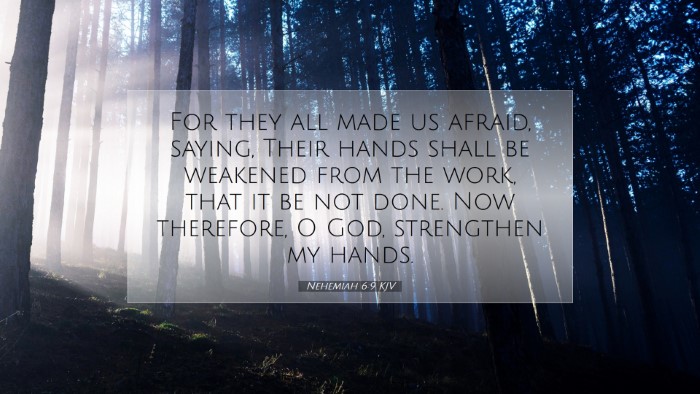Old Testament
Genesis Exodus Leviticus Numbers Deuteronomy Joshua Judges Ruth 1 Samuel 2 Samuel 1 Kings 2 Kings 1 Chronicles 2 Chronicles Ezra Nehemiah Esther Job Psalms Proverbs Ecclesiastes Song of Solomon Isaiah Jeremiah Lamentations Ezekiel Daniel Hosea Joel Amos Obadiah Jonah Micah Nahum Habakkuk Zephaniah Haggai Zechariah MalachiNehemiah 6:9
Nehemiah 6:9 KJV
For they all made us afraid, saying, Their hands shall be weakened from the work, that it be not done. Now therefore, O God, strengthen my hands.
Nehemiah 6:9 Bible Commentary
Commentary on Nehemiah 6:9
Nehemiah 6:9 states: "For they all made us afraid, saying, Their hands shall be weakened from the work, that it be not done. Now therefore, O God, strengthen my hands." This verse encapsulates the intense spiritual warfare and perseverance characteristic of Nehemiah's leadership during the rebuilding of the walls of Jerusalem. It highlights various themes such as opposition, prayer, and divine strength.
Contextual Analysis
The book of Nehemiah chronicles the efforts of Nehemiah, a Jewish leader and cupbearer to the Persian king, to return to Jerusalem and restore the city after the Babylonian exile. Chapter 6 records the culmination of escalating opposition faced by Nehemiah from surrounding factions, notably Sanballat and Tobiah. The threats to Nehemiah's undertaking were not merely physical; they were also psychological, as noted in the phrase "they all made us afraid."
Opposition to God's Work
In this verse, Nehemiah expresses the fears incited by their enemies, illustrating a common tactic used by adversaries of God’s people: to instill fear and weaken resolve. Matthew Henry comments on the psychological warfare employed by Sanballat and his allies, pointing out that fear can often act as a disruptive force compelling believers to abandon their duties. "They sought to distract and dishearten Nehemiah," notes Henry, emphasizing how fear can lead to paralysis in the face of God’s work.
Nehemiah’s Response
Nehemiah's reaction to the opposition exemplifies faithful leadership. Instead of succumbing to fear, he turns to God in prayer, asking for strength. Albert Barnes highlights the importance of Nehemiah's prayer as a direct request for divine assistance: "Now therefore, O God, strengthen my hands." This prayer indicates not only Nehemiah’s reliance on God but also his earnestness to continue the work despite the threats faced.
The Role of Prayer
The act of praying for divine strength reveals an underlying theology regarding human effort versus divine empowerment. Adam Clarke elaborates on this dynamic, noting that while human diligence is essential, it is incomplete without God’s empowerment. "The laborers may work, but it is God that strengthens their hands," Clarke emphasizes. This perspective encourages believers to recognize their need for God's intervention in moments of struggle.
Thematic Implications for Today's Believers
- Spiritual Warfare: Nehemiah's situation serves as a reminder that opposition to God's work is an ongoing reality for believers. The fear instilled by adversaries can be both internal and external, necessitating a firm reliance on God.
- The Power of Prayer: Nehemiah's direct appeal to God underscores the necessity of prayer in facing challenges. It teaches that believers should consistently seek divine strength to carry out their God-given tasks.
- Community and Unity: This passage illustrates the importance of unity among God's people. Just as Nehemiah stood firm in the face of opposition, church leaders today are called to foster unity and strength among their congregations.
- Human Limitations and Divine Capacity: The acknowledgment of the limits of human ability juxtaposed against the limitless power of God encourages humility and dependence on divine support in all endeavors.
Conclusion
Nehemiah 6:9 is rich with insights pertinent to pastors, scholars, and students of Scripture. It addresses crucial aspects of faithfulness under adversity, the efficacy of prayer, and the need for divine assistance. As Nehemiah sought God for strength amidst discouragement, so must contemporary believers navigate their own challenges, relying on divine power to fulfill God's mission on Earth.
In summary, this verse invites reflection on faith, resilience, and the importance of divine help in undertaking any work that furthers God's kingdom. It challenges us to identify fears we may hold and encourages us to present them before God, who is more than able to strengthen us for the tasks at hand.


